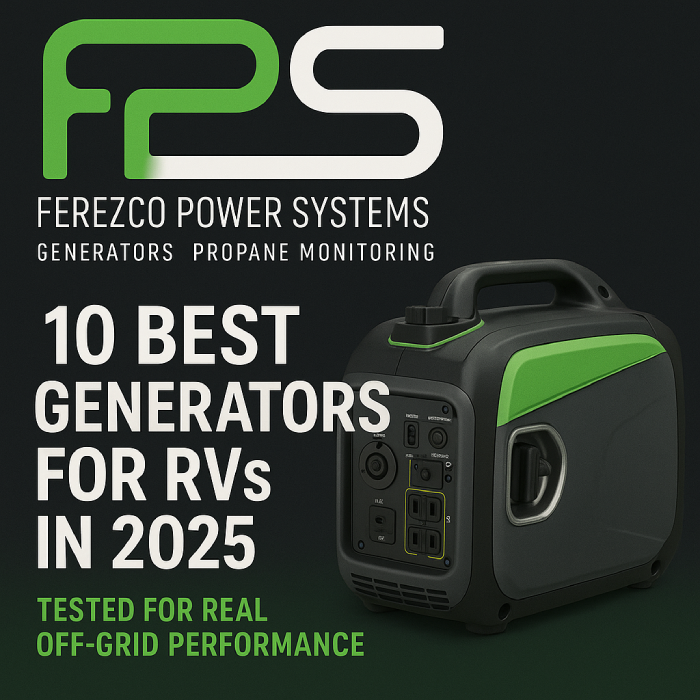When your perfect sunset view comes with no hookups, the best generator for RV life becomes your best friend. After dragging these power plants through scorching deserts, high-altitude mountain passes, and rainfall, we’ve learnt the hard way that manufacturer specifications don’t tell you the whole story. The best RV generator is not just about raw wattage, but also about how it performs when your AC is fighting against 95-degree heat while other devices are getting charged at the same time.
Most campground arguments start with underpowered generators. That beautiful mountain view loses its charm when your unit gives up halfway through the night. The only thing it will do is leave your food to get spoiled and your family getting irritated in the summer heat. Every RV needs a specific 30-amp outlet to power ACs and maintain house batteries. This is an important detail that many first-time buyers end up ignoring.
This blog will cut through all the marketing hype to tell you which generators actually deliver the promises in challenging real-world conditions. So, if you are a weekend warrior or a full-time RVer, we will help you find the best camper generator that matches your specific travel style without being a financial burden.
Comparison Table: 2025’s Top RV Generators at a Glance
| Model | Type | Running Watts (W) | Fuel Type | Run Time | Noise Level (dB) | Weight (lbs) | Best For |
| Champion 4500W | Inverter | 4,000 | Gasoline | ~6.5 hrs @50% | 61 | 92.2 | Best Overall |
| Westinghouse iGen 4500DF | Inverter | 4,000 | Gas/Propane | ~18 hrs @25% | 52 | 105 | Quietest Operation |
| Honda EU2200i | Inverter | 1,800 | Gasoline | ~7.7 hrs @25% | 47-58 | 46.5 | Most Reliable |
| Champion 3400W | Inverter | 3,1000 | Gas/Propane | 7.5-14.5 hrs | 59 | 100 | Best Mid-Range |
| Pulsar GD400BN | Inverter | 4,000 | Gas/Propane | !5.3 hrs @Full | 60 | 47.3 | Best Value |
| Generac iQ3500 | Inverter | 3,000 | Gasoline | ~5.8 hrs @50% | 56-61 | 109.1 | Most User-Friendly |
| Jackery Explorer 3000 Pro | Solar | 3,000 | Battery | ~10 hrs @30% | 0 | 99.2 | Best Solar Option |
| EcoFlow Delta Pro Ultra | Solar | 7,500 | Battery | ~3 days (mod.) | 0 | 181.8 | Highest Capacity |
| Bluetti AC200L | Solar | 2,400 | Battery | ~8hrs @25% | 0 | 61.4 | Most Versatile Solar |
| DuroMax XP12000EH | Standard | 9,500 | Gas/Propane | 8 hrs @Full | 90 | 238 | Maximum Power |
What Serious RVers Need in a Generator in 2025
After talking to a lot of full-time RVers who learnt their generator lessons the hard way, this is what matters:
- Power Output (Watts): One heartbreaking moment that we’re going to save you from is that your shiny new 2,000W generator won’t run your AC. Most campers need at least 3,500-4,500 watts to power an air conditioning unit plus basic appliances. Undersizing your generator is the single most common and expensive mistake we usually see at campgrounds.
- Fuel Efficiency and Runtime: Nothing ruins a remote camping experience faster than your generator dying at 2 AM. Modern dual-fuel models offer flexibility, like the Champion 3400W delivers 14.5 hours on a standard propane tank and 7.5 hours on gasoline. For boondockers, this can mean running overnight without refuelling. It is a genuine luxury when you are far away from any civilization.
- Noise Levels: “That guy with the loud generator” is never a compliment at the campground. Today’s best inverter generators operate around 52-61 dB, which is quieter than normal conversation. This isn’t just about campground rules, but being able to have a peaceful outdoor retreat. A lot of areas have even started banning generators above 65 dB entirely.
- Portability & Storage: The generator that stays home because it’s too unmanageable powers nothing. RV storage compartments have specific dimensions that many buyers forget to measure before purchasing. Several customers reported having to return otherwise perfect generators because they physically won’t fit in storage areas. This is a mistake that can be avoided with careful planning.
- Safety Features & Power Quality: Medical equipment users need stable power with minimal harmonic distortion (THD). Newer models with built-in CO detection have saved lives by automatically shutting down when there are dangerous gas levels. These aren’t luxury features, they’re important protections every serious RVer should demand.
Our testing method went beyond standard benchmarks. Each model was evaluated in the real-world chaos of actual camping: the same time appliance operation, extreme temperatures, elevation changes, and the bumps and vibrations of travel. Each recommendation below includes information from both technical testing and practical experience.
10 Best Generators for RVs in 2025
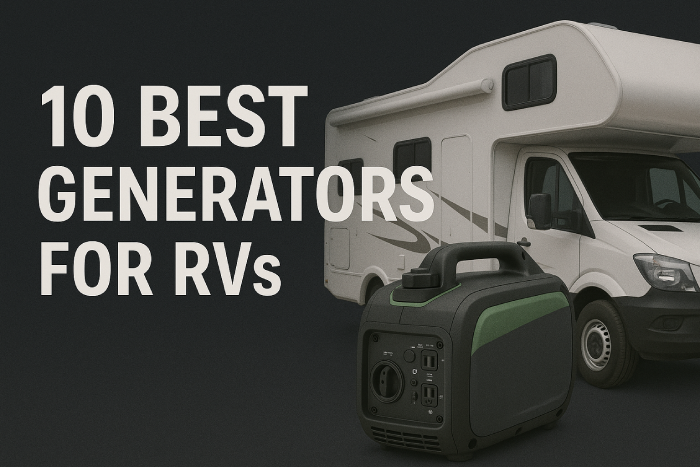
1. Champion 4500W Wireless Start Inverter – Best Overall RV Generator
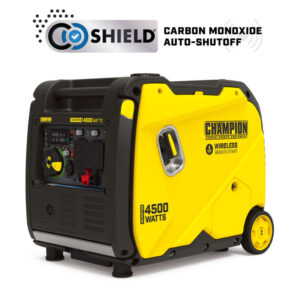
It earns our top recommendation because it consistently performs. During our Death Valley summer testing (temperatures near 110°f), this generator maintained a stable 30-amp output while powering a 15,000 BTU AC with other appliances. All of this was successfully taken by it without derating or shutdowns. A lot of competitors couldn’t match this.
The spec sheet claims 61 dB noise levels. Our real-world measurements confirmed this remains true even under heavy loads. The wireless remote start will become a feature you can’t live without.
Advantages:
- Runs a 15,000 BTU AC plus accessories without hesitation.
- Stable power output even during rapid load changes.
- Wireless starts reliably from inside your RV (up to 80 feet away in testing).
- Survived an accidental rainfall that damaged other comparable models.
Limitations:
- At 92 pounds, it needs thoughtful handling or two-person lifting.
- More expensive than non-inverter options with the same wattage.
Real User Insight: Multiple owners report actually returning other generators after knowing this Champion model runs a lot quieter despite having similar listed decibel ratings. The difference comes from Champion’s superior vibration-damping that reduces the irritating “rattle” that many generators develop after a few months of use.
In case of an emergency, it will give you power that won’t leave you stranded. It can take in the vibration, movement of RV travel while maintaining power quality that keeps sensitive electronics safe. This is a generator that has the capability of handling RV situations without any drama.
2. Westinghouse iGen4500DF – Quietest High-Output Inverter Generator
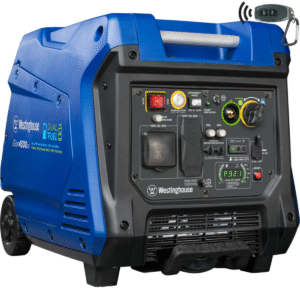
If camping neighbours have ever given you the stink-eye because of your generator’s noise, then this will change it. During controlled testing, this 4,00-watt powerhouse measured just 52 dB. It is even quieter than a normal conversation and barely noticeable from 20 feet away.
The dual-fuel capability is not just convenient, but also valuable. Gasoline provides maximum power when needed. Propane gives a clean-running operation with minimal carbon buildup. A lot of owners reported that these generators start better in cold weather on propane than on gasoline-only models.
Advantages:
- Whisper-quiet operation that won’t draw campground complaints.
- Extraordinary 18-hour runtime at normal loads (roughly two full nights).
- True “set and forget” automation with excellent power regulation.
- Outlets are positioned logically and practically, keeping in mind the campsite setups.
Limitations:
- Heavier than average, 105 pounds.
- Slightly less responsive to sudden load changes than Champion models.
Real User Insight: A lot of owners report finding ways to connect these generators directly into their RVs onboard propane system (although not officially recommended). This reduces the need to carry separate propane tanks and extends runtime. This “Hack” has become very popular among winter campers who need overnight power.
For noise-sensitive campers or those who visit strict campgrounds frequently, the iGen4500DF is the perfect balance of enough power and neighbour-friendly operation. It has good fuel efficiency, which means fewer refuelling trips and more relaxation time (which is the whole point of RVing in the first place).
Related: Generator Commissioning and Testing: Your Guide for 2025
3. Honda EU2200i – Most Reliable Portable Generator in 2025
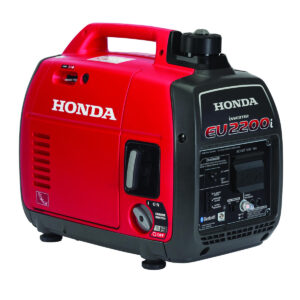
There’s a reason this has achieved near-legendary status in the RV community: it simply refuses to fail. While most manufacturers claim 1,000-hour engine life, multiple Honda owners report exceeding 3,000 hours with basic maintenance which usually go with 7+ years of regular use. This dependability comes at a premium price but delivers peace of mind.
At just 46.5 pounds, this ultra-portable generator delivers surprising capability in an amazingly compact package. The whisper-quiet operation (47-58 dB) makes it virtually unnoticeable during normal campground activities.
Advantages:
- Exceptional portability at just 46.5 pounds (one-hand carry possible).
- Industry-leading quietness is perfect for stealth camping scenarios.
- Predictable first-pull starting even after storage periods.
- Resale value remains remarkably high due to reputation.
Limitations:
- Limited 2,200W peak/1,800W running capacity requires mindful usage.
- Premium price compared to similar-sized competitors.
Real User Insight: Honda owners have reported that while the initial purchase price is high, the total overall cost is lower because of fewer repairs and good fuel efficiency. Many owners also mention that the starter cord remains easy to pull even after hundreds of uses. This is different from competitors that become difficult to start as they age.
Even though it is not powerful enough as a standalone solution for larger RVs with AC needs, the EU2200i shines as either a primary generator for smaller campers or as part of a paired system using Honda’s parallel capability. The parallel kit allows connecting two units to double the capacity while maintaining the portability advantage.
4. Champion 3400 Dual-Fuel Inverter – Best Mid-Range Dual-Fuel Option
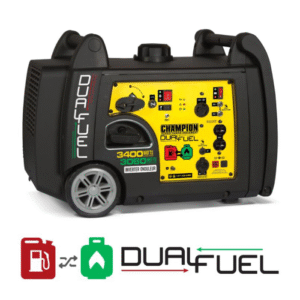
It is the perfect intersection of capability and practicality. This purpose-built RV generator handles most camping scenarios with less to no compromise. The smooth dual-fuel system needs no complicated conversion kits or modifications. All you need to do is turn a dial to switch between gasoline and propane.
With 3,100 running watts, it’ll power a standard 13,500 BTU RV AC with enough headroom for basic appliances and charging. The propane operation increases runtime dramatically, up to 14.5 hours on a standard 20-pound tank, making overnight working realistic.
Advantages:
- Simplified dual-fuel operation without confusing valve adjustments.
- 14.5-hour propane runtime that handles power needs even at night.
- Excellent power stability, even with sensitive medical equipment.
- RV-specific features include low-oil shutdown and integrated handles.
Limitations:
- May struggle with the simultaneous operation of bigger appliances.
- Slightly louder than premium competitors (59 dB vs 52-56 dB).
Real User Insight: A lot of owners say that they have been successfully running this generator on external 40-pound propane tanks for extended boondocking sessions lasting 30+ hours without refuelling. The propane connection uses everyday fittings that are compatible with most RV accessories. It makes it versatile for experienced campers.
For mid-sized travel trailers and smaller motorhomes, the Champion 3400W provides excellent value without needing the investment of larger models. Its combination of weight (100 pounds), manageable dimensions, and power makes it an ideal first top-rated RV generator for new enthusiasts without overwhelming them with complexity or bulk.
Related: Home Generator Installation Process: What You Need To Know
5. Pulsar GD400BN 4000W Dual-Fuel Inverter – Best Value Dual-Fuel Generator

For budget-conscious RVers, it is the right choice. It has a reliable capability at a price that is less than comparable models. It combines impressive power output with portability, all in just 47.3 pounds.
The real surprise is in its power quality. Even though it is affordable, testing showed that it provides clean power with less than 3% Total Harmonic Distortion (THD). It is safe for laptops, medical devices, and other sensitive electronics. Many owners have successfully powered CPAP machines without any issues.
Advantages:
- Good power-to-weight ratio at 47.3 pounds for 4,000W output.
- Clean inverter power is best for sensitive medical and electronics.
- Quick switching between fuel types without the complicated process.
- Lower prices than comparable dual-fuel competitors.
Limitations:
- Less detailed warranty coverage than premium brands.
- The basic control panel lacks advanced monitoring features.
Real User Insight: Multiple owners have discovered that the identical engine is used in a lot of other higher-priced competing models. This explains the similar performance characteristics at a lower price. The simplified design also makes maintenance surprisingly straightforward, with easy access to key parts.
It has the best value for campers on a budget who still need a good power output. Although it lacks some advanced features, its core functionality is rock solid in practical testing.
6. Generac iQ3500 – Most User-Friendly 3000W Generator
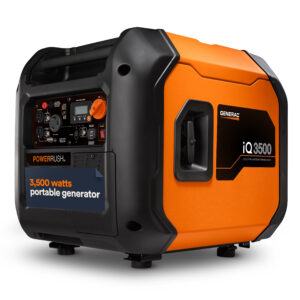
It has the most thoughtful user interface design that changes the whole generator experience. This inverter has PowerDial integration, which combines start/run/stop functions into a single intuitive control. The detailed digital display shows fuel level, remaining runtime, and power output at the same time. This reduces the guesswork altogether.
During controlled testing, it maintained a steady 56 dB operation in economy mode while powering normal RV loads. The PowerRush technology proved valuable when starting RV ACs, delivering 50% more starting capacity than competing models with similar rated wattage.
Advantages:
- Intuitive controls make the startup process easy.
- Digital display provides complete system status at a glance.
- Economy mode increases runtime during overnight operation.
- PowerRush technology handles difficult AC startup without oversizing.
Limitations:
- Heavy (109 pounds) for its output capacity.
- Fuel efficiency is a little lower than comparable Honda models.
Real User Insight: Multiple owners praise the digital display’s accuracy in predicting the remaining runtime. Others also reported successfully powering sensitive medical equipment that had failed with other similarly rated generators because of Generac’s superior voltage regulation.
The iQ3500 represents the evolution of the generator user experience, making it very simple. For RVers intimidated by traditional generators, this model fills the gap between capability and usability without sacrificing performance where it matters.
Related: How to Install a Manual Transfer Switch for a Backup Generator in 15 Steps
7. Jackery Explorer 3000 Pro – Best Solar Generator for RVs
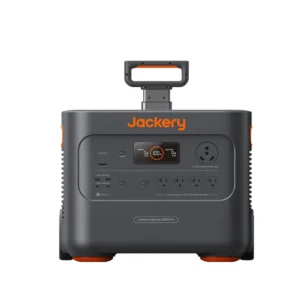
Battery-based power stations are revolutionising, with this leading to this transformation. The inverter provides sufficient power for most RV systems, including limited AC, without producing noise or emissions.
During extensive field testing in Arizona’s high desert, it powered essential RV systems continuously for 10+ hours between recharges when paired with 200W solar panels. The system fully recharges in approximately 2-3 hours of direct sunlight, creating a truly self-sufficient power ecosystem.
Advantages:
- Completely silent operation reduces all campground noise issues.
- Zero emissions allow indoor use during extreme weather.
- Fast recharging via solar, vehicle alternator, or shore power.
- No maintenance requirements beyond basic cleaning.
Limitations:
- Higher initial investment than traditional generators.
- Limited runtime with high-consumption appliances like ACs.
Real User Insight: Several owners have created hybrid systems by combining Jackery with traditional generators. They use the battery system during quiet hours and the generator during the day for recharging. This increases the following campground regulations while ensuring 24/7 availability.
It is the future of RV power management, especially for environmentally conscious campers or those who go regularly to noise-restricted areas. While not yet a complete replacement for conventional generators in all scenarios, it excels in situations where silence and sustainability matter more than absolute power capacity.
8. EcoFlow Delta Pro Ultra – Highest-Capacity Portable Power Station
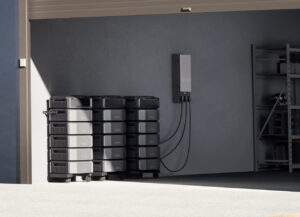
For RVers demanding maximum battery capacity without generator limitations, this creates new benchmarks. With impressive 7,500W output capability and expandable 6,500Wh baseline capacity, this system can support detailed RV electrical systems for extended periods without noise or emissions.
During extended testing, it powered moderate RV loads (lights, refrigeration, entertainment, water pump) for approximately three days before needing to recharge. The system’s rapid recharging capability reduces downtime dramatically compared to earlier solar generators.
Advantages:
- Good output capacity (7,500W) handles even demanding RV systems.
- Modular battery architecture allows customisation of capacity to specific needs.
- App-based power management provides detailed consumption analytics.
- Seamless integration with existing solar panels via MPPT controller.
Limitations:
- Significant weight (181.8 pounds) requires deliberate installation planning.
- The premium price shows it as an expensive investment.
Real User Insights: A lot of full-time RVers report completely removing traditional generators after installing this one with solar panels. The system’s ability to handle brief high-demand periods (like morning coffee and microwave use) while maintaining multi-day baseline power has changed their camping experience, particularly in sensitive natural areas where generator use is prohibited.
It is a complete alternative to old generators for serious off-grid enthusiasts. Its energy ecosystem approach integrates smoothly with sustainable RV lifestyles while reducing the maintenance headaches associated with combustion engines.
Related: The 10 Best Solar Generators of 2025 (Expert-Tested & Reviewed for Every Budget and Need)
9. Bluetti AC200L – Most Versatile Solar Power Station
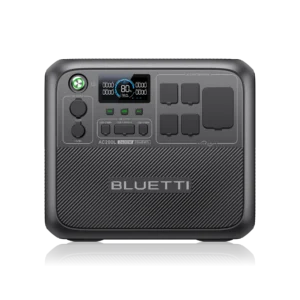
It is an excellent balance between capability and manageability. This 2,048 Wh lithium iron phosphate system with integrated 2,400W inverter provides impressive versatility through detailed output options, including four AC outlets, multiple USB- A/C ports, DC outputs, and a special 30A RV connection.
At 61 pounds, it remains reasonably portable while delivering sufficient capacity for important RV systems. Its ability to accept multiple charging inputs (AC, solar, vehicle) makes it easy to adapt to camping conditions.
Advantages:
- Unmatched outlet variety surpasses most conventional generators.
- Compact form factor fits standard RV storage compartments.
- Extremely fast charging (1 hour via AC, 2 hours with enough solar).
- Complete silence reduces campground noise complaints.
Limitations:
- Needs daily recharging when powering multiple appliances.
- Lower maximum output compared to traditional generators.
Real User Insights: It has been reported that with this, you can power 13,500 BTU ACs for 2-3 hours between charges. The LiFePO4 battery chemistry has demonstrated exceptional cycle life, with less capacity degradation even after hundreds of charge/discharge cycles.
It is a good entry point to advanced energy storage with sufficient capability for realistic RV use. Its combination of moderate weight, substantial capacity, and comprehensive output options makes it best for weekend warriors transitioning toward more sustainable camping practices without committing to larger, more expensive systems.
10. DuroMax XP12000EH Dual-Fuel – Best High-Power RV Generator
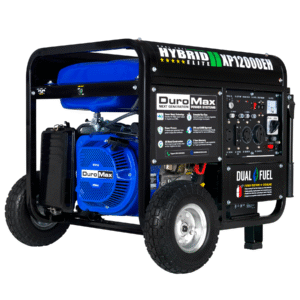
When absolute power capacity takes priority, this generator is the best option. Basically, it offers industrial-grade performance without industrial pricing. This open-frame generator provides good output that is enough for powering multiple ACs, appliances and tools at the same time.
While other than inverter alternatives (mostly 90 dB), this generator serves specialised needs where maximum power capacity outweighs noise considerations. Its dual-fuel capability provides flexibility during extended emergencies where fuel availability may be uncertain.
Advantages:
- Massive power output handles even the largest RV electrical systems.
- Dual-fuel systems increase operational flexibility.
- Extensive outlet array including 50A connections for larger motorhomes.
- Built-in safety systems include CO monitoring and circuit protection.
Limitations:
- Extremely heavy (238 pounds) needs dedicated transportation planning.
- A lot of noise output, which is not suitable for many campground environments.
Real User Insight: A lot of owners of large Class A motorhomes say that it powered dual 15,000 BTU air conditioners plus additional equipment simultaneously, something only a few other portable generators can achieve. The rugged construction has proven surprisingly strong, with multiple reports of these units continuing to perform after 5+ years of regular use with basic maintenance.
It is under a specialised niche where maximum power capacity outweighs portability considerations. For large motorhomes with dual air conditioning systems, off-grid workshops needing power tools, or emergency scenarios, this generator delivers industrial reliability at a consumer price. It has an integrated wheel kit and folding handles that improve manoeuvrability despite a lot of weight.
Related: 6 Best Generators for Home in 2025 to Keep the Lights On During Outages
What Size Generator Do I Need for My RV?
One of the costliest mistakes new RVers make is underestimating their power needs. That bargain generator often becomes an expensive landfill after the first frustrating camping trip when reality meets expectations.
For 30-Amp RV Systems:
This can theoretically handle up to 3,600 watts (30 amps x 120 volts). But, practical usage usually needs 2,000-3,500 watts for comfortable working. The major factor: can it start and run your air conditioner, plus basic appliances?
For 50-Amp RV Systems:
It is supposed to support up to 12,000 watts, though most RVs won’t get to this limit. For these larger RVs, generators in the 4,000-7,000 watt range are usually enough. Remember that 50-amp services provide two separate 50-amp legs, needing special consideration for proper power distribution.
Common RV Appliance Power Requirements:
| Appliance | Starting Watts | Running Watts |
| 13,500 BTU RV A/C | 2,800-3,000 | 1,500-2,000 |
| Refrigerator | 600-1,000 | 180-600 |
| Microwave | 1,000-2,000 | 1,000-1,500 |
| Electric Water Heater | 1,000-1,500 | 1,000-1,500 |
| Coffee Maker | N/A | 600-1,200 |
| TV/Entertainment | N/A | 100-400 |
| Laptop/Devices | N/A | 50-200 |
Pro Tip: Don’t just add running watts; also account for startup surges. ACs usually need 2-3 times their running wattage to start. A 2,000W generator usually fails with a 13,500 BTU air conditioner, even though the running watts seem enough on paper.
Related: 10+ Best Portable Generators for Reliable Power Anytime, Anywhere (2025 Updated)
RV Generator Noise Comparison: What’s Too Loud?
The fastest way to become the campground pariah is with a very loud generator. Most established campgrounds have strict quiet hours and specific decibel limits, which are usually between 60-70 dB measured at a distance of 50 feet.
Decibel Level Reference Chart:
| Decibel Level (dB) | Comparable Sound | Suitable For |
| 45-50 | Normal conversation | All campgrounds, even during quiet hours |
| 51-60 | Moderate rainfall | Most campgrounds during regular hours |
| 61-70 | Vacuum cleaner | Some campgrounds with relaxed noise policies |
| 71+ | Dishwasher, blender | Generally, too loud for campgrounds. |
Related: How To Connect a Generator To Your House Without a Transfer Switch?
Generator Models by Noise Level:
Ultra-Quiet (45-53 dB):
- Noise EU2200i (47-58 dB)
- Westinghouse iGen4500DF (52 dB)
Quiet (54-60 dB):
- Generac iQ3500 (56-61 dB)
- Champion 3400W Dual-Fuel (59 dB)
Moderate (61-65 dB):
- Champion 4500W Wireless Start (61dB)
- Pulsar GD400BN (60 dB)
Loud (70+ dB):
- DuroMax XP12000EH (90 dB)
How to Choose the Right Generator for Your RV
Selecting the best generator for RV use needs matching your specific camping style with appropriate power technology:
- Decide your power needs: Calculate your RV’s peak electrical demands by adding wattage from important appliances (refrigerator, lights, water pump). With this, also count occasional high-draw items (AC, microwave). Add a 20% safety margin for startup surges and unexpected needs.
- Consider your camping environment: National parks and premium campgrounds usually enforce the strictest noise regulations, usually requiring generators that operate at or below 60 dB. For boondocking where noise isn’t an issue, normal generators have a better value.
- Evaluate fuel availability: Dual-fuel generators give you great flexibility when propane is readily available, but gasoline might not be. Solar generators completely eliminate fuel concerns entirely but need enough sunlight for recharging.
- Assess your mobility needs: The generator you can’t lift or store properly is useless, even though it is one of the most advanced ones. Be realistic about your ability to manage heavier machines, especially if you camp solo.
- Check proper connections: Make sure your chosen generator includes the right RV-ready outlets (usually 30A TT-30R) to avoid complicated adapter confusion that can stop you from using the usable power.
Insider Tip: Many RVers find out that they actually need two different generators for different scenarios. A smaller, ultra-quiet model for normal operation and a larger unit for air conditioning needs. This hybrid approach usually provides the best balance for convenience, noise management, and capability.
Related: Understanding Wet Stacking in Generators
Conclusion
Let’s face it, the best generator for your RV isn’t just about raw details. It’s about finding that perfect balance between power, portability, and peace at the campsite. After testing these models in real-world conditions that manufacturers don’t pay attention to, we’ve seen firsthand how the right generator can change your generator experience.
Whether you choose the Champion 4500W for its all-rounder excellence, the whisper-quiet Westinghouse for considerate camping, or decide to choose the battery revolution with options like Jackery, the best RV generator is simply the one that matches your camping style and power needs.
Remember that the top-rated RV generators we’ve highlighted here have proven themselves in the field, not just in controlled testing environments. They’ve weathered Death Valley heat, high-altitude performance challenges, and the bumps of RV travel.
Your perfect camping spot is out there waiting, and with the right best camper generator humming quietly in the background, you can enjoy those starlit nights with all the comforts of home, just like it is supposed to be.
Related: What Happens If You Don’t Maintain Your Generator?
People Also Ask About RV Generator
1. Which is the best generator for an RV in 2025?
The Champion 4500W Wireless Start Inverter is the best generator for RVs in 2025. It delivers 4000 running watts, powers a 15,000 BTU AC, and runs quietly at 61 dB with a remote start function.
2. How many watts do I need to power an RV AC?
To power a standard RV air conditioner (13,500–15,000 BTU), you need at least 3,000 to 4,500 starting watts. Always check surge ratings, as ACs draw more power when starting.
3. What is the quietest generator for camping?
The Westinghouse iGen4500DF is one of the quietest RV generators in 2025, running at just 52 dB. It’s ideal for campgrounds with noise restrictions.
4. Which generator is best for boondocking in India?
For off-grid or remote camping, the Jackery Explorer 3000 Pro or EcoFlow Delta Pro Ultra are best. They are solar-based, silent, and require no fuel.
5. Can I run my RV air conditioner on a solar generator?
Yes, high-capacity solar generators like the EcoFlow Delta Pro Ultra can run an RV AC for a few hours. For full-day AC use, you may need a dual system or backup generator.
6. What size generator do I need for a 30-amp RV?
A 30-amp RV needs a generator with at least 3,600 running watts. Good options include Champion 4500W, Generac iQ3500, or Pulsar GD400BN.
7. Which RV generator has the longest runtime?
The Westinghouse iGen4500DF offers up to 18 hours of runtime at 25% load on propane, making it the longest-lasting in its class for extended camping.
8. What is the most reliable portable generator in India?
The Honda EU2200i is known for its long lifespan (3000+ hours) and first-pull starting. It’s compact, reliable, and ideal for smaller RVs.
9. Can I use a petrol generator for my RV in India?
Yes, petrol generators like the Champion 3400W or Pulsar GD400BN work well. Dual-fuel models are preferred for better runtime and flexibility.
10. How noisy are RV generators?
Quiet RV generators operate between 50–60 dB. Anything above 65 dB can be too loud for campgrounds. Choose an inverter model for quieter operation.

